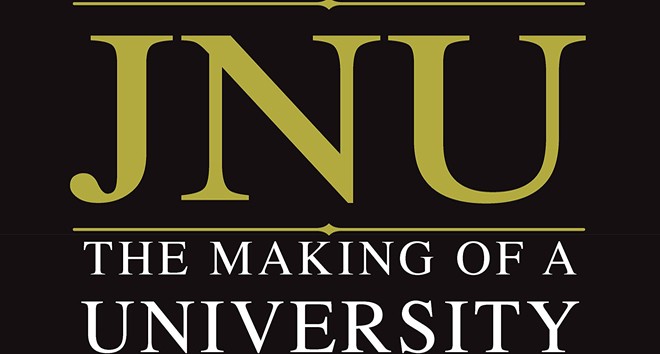
A book about a university that reads more like a history of the country

When JNU -- The Making of a University by Rakesh Batabyal was launched at the Indian History Congress at Jawaharlal Nehru University, my impression was that it must be a reference book about the university’s departments etc. To my pleasant surprise, the book turns out to more about the history of India. One may ask how could a book about a university deal with the history of a country. The credentials of the author come in handy in attempting to answer this question.
Rakesh Batabyal has been a fellow of Indian Institute of Advanced Studies, Shimla (1996-1999), National Institute of Punjab Studies (2004) and was the Inaugural Chair of Contemporary Indian History at Tokyo University (2010). As deputy director of the Academic Staff College of Jawaharlal Nehru University, he has contributed in making the college one of the most dynamic academic centres in the country. Batabyal teaches history of media at the Centre for Media Studies in JNU. Educated at St. Xavier’s College, Ranchi, and Centre for Historical Studies, JNU, he brings his training in philosophy to examine the issues of contemporary history.
He is a ‘devotee’, student and member of the Delhi Group of Historians, founded by late Professor Bipan Chandra. Understandably, he has dedicated this book to his guru Bipan Chandra (1926-2014).
Giving the background of the creation of JNU, he writes "On a cold winter afternoon in 1964, the year was electric with anticipation in the Rajya Sabha, the Upper House of parliament, as M. C. Chagla, the minister of education at the time, presented the Jawaharlal Nehru University Bill". Chagla was the first Indian chief justice of Bombay High Court and an assistant of Jinnah. The university was designed to bring the frontiers of science and technology within easy reach of the Indian students, and simultaneously integrate humanistic learning into the curriculum.
While taking part in the debate communist leader Bhupesh Gupta said: "Let us not have Cambridge and Oxford….."
Gupta’s argument for a new and advanced university which would be accessible to all economic classes was not intended as a case for patriotism; however, it had a definite tinge of anti-colonialism. Oxford and Cambridge had become symbols of colonial intellectual hegemony and there was a need to break this control.
In the first and second chapters, Batabyal has written extensively about the debate in the legislative assembly for the creation of JNU. Although many leading intellectuals and parliamentarians played a very important role in the establishment of JNU, the author thinks M. C. Chagla played a vital and pivotal role; so he has devoted 19 pages to the biography of M. C. Chagla alone.
Jawaharlal Nehru was averse to creating an institution in his name; it was through the efforts of Chagla that the new university got its name.
After partition, the population of Delhi shot up from seven to 12 lakhs so there was need for another university. Education was a provincial subject but the leaders of freedom movement wanted to establish a national university. The basic purpose was to provide affordable education and without class, gender, urban/rural discrimination.
G. Parthasarathy, a former correspondent of Press Trust of India in London and Indian ambassador to UNO, was appointed its first Vice Chancellor. The first registrar was V. N. Murthy, who had helped set up the Poona Film and Television Institute. It was decided that unlike other universities, JNU should not affiliate colleges; rather it should establish its own schools and centres.
According to the author, communists of India played a very important role to make sure that JNU should be "anti-imperialist" in scope.
The author has minutely dealt with the national politics and international affairs and its impact on JNU. He has given lot of space to students politics and unions at JNU. All political parties had their wings in JNU but, most of the time, the students union was controlled by the communists. CPI(M)’s former and present chairperson Karat and Sitaram Yechury had been president of JNUSU. He also quoted the slogan of Sitaram Yechury’s election ‘Achchha Kam, Achaha Nam, Sitaram, Sitaram’.
Among the first departments which the JNU established were Pakistan and Chinese Studies (two countries with which it had not so good relations). One can ask this question of ourselves: do we have Indian Studies department at any level in any educational institution?
His Excellency RCA Raghvan, High Commissioner of India to Pakistan and his wife, were both students of JNU. Now their daughter is also studying there.
The author has discussed the cultural life and ethos of the JNU -- the food, the dhabas, the residential facilities provided by lower staff to the students during holidays: in one instance, a chowkidar was the host of the author.
Prof. Romila Thapar, Ramadhikari, S K Mathur, Kumara Preeti Kaul, S. Gopal, Satish Chandra, Prof Yogendra Singh, Bhabani Sengupta, Harbans Mukhia, Bipan Chandra, Imtiaz Ahmed, Zoya Khaliq, Aswini K. Ray and Zafar Imam, to name a few among others, played very vital and invaluable role in setting high traditions and standards. Now their students Mridula and Aditya Mukherjee and others are carrying the baton.
A student of JNU who is doing research on Khalistan Movement told me that JNU is a hub of all radicals, dissidents and separatist movements. It is definitely one of the leading world-class universities. Its former students are playing a leading role in the administration and politics of India.
The author has dealt with the topic creatively and made it a pleasant read; it is essentially a labour of love. The book is a must read for legislators, policy makers, students of history, politics and academia.